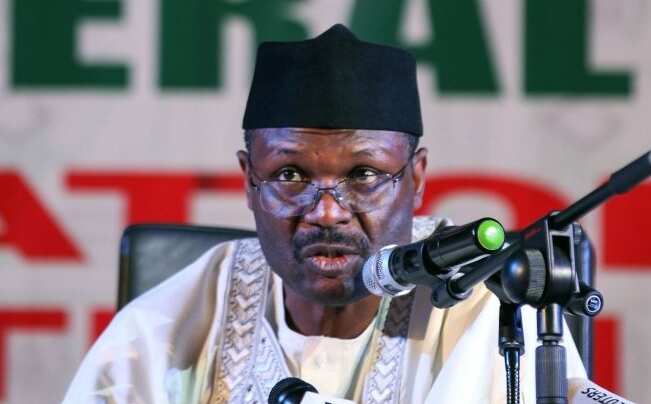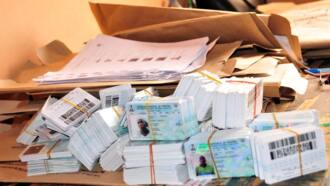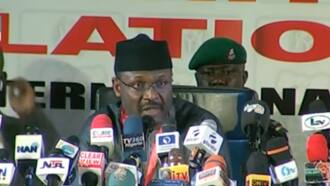Before Nigeria Dives Into a PVC Collection Crisis, by Abideen Olasupo
Editor's note: In this piece, Olasupo Abideen raised concerns over the high rate of uncollected PVCs while making a case for electorates by urging the Independent National Electoral Commission (INEC) to make collection seamless
PAY ATTENTION: Сheck out news that is picked exactly for YOU ➡️ find the “Recommended for you” block on the home page and enjoy!
As a Nigerian passionate about the electoral process and willing to participate, you begin to wonder if the entire dynamic electoral process is all designed to either frustrate you or make participation some kind of survival of the fittest.
This is probably the easiest way to describe the entire process of being a registered voter and eligible to vote on election day.

Source: Facebook
Right from the process of visiting the Independent National Electoral Commission (INEC) office usually some distance from residential areas, joining the queues and eventually getting registered.
After enduring conflicting information on the readiness of your Permanent Voters Card (PVC), you eventually take the pain to visit the INEC office for collection and get greeted with the response that, the voter’s card is still not ready.
PAY ATTENTION: Join Legit.ng Telegram channel! Never miss important updates!
This is the situation of many Nigerians who remain determined to participate in the 2023 general elections as the challenge with PVC collection persists.
With close to 20 million uncollected Permanent Voters Cards from 2011 and another over nine million new registrants between June 2021 and July 2022, the least Nigerians deserve is an effective way to ensure all eligible voters collect their cards and participate in the 2023 general elections.
The commission itself in recent times has continued to lament the low PVC collection across various states which remains a major cause of concern.
For instance, there are about 1.7 million uncollected PVCs in Lagos state, about 500,000 uncollected cards in Abuja, and over 160,000 people in Kogi state who have abandoned their cards at the INEC offices in the state. This is the case across all 36 states of Nigeria.
No doubt the condemnable attacks on INEC offices in some parts of the country have not helped the preparatory cause for the elections with over 50 offices attached in the last three years.
However, the threshold for conducting credible elections must not drop especially in the area of citizens' participation.
While it is the responsibility of registered voters to visit the INEC office in their Local Government of registration to collect the cards as INEC does not distribute voters card to people’s residents, the commission must develop an effective strategy to ensure the process is seamless.
There is no doubt that INEC has in recent times harnessed the use of innovative technology to promote transparency and ensure efficacy in its process.

Read also
Year in review: Top political promises made by presidential candidates ahead of 2023 elections
With comprehensive data on registered voters and PVCs printed, the commission with the support of CSOs can develop a strategic standard of operation to make the process easier and faster.
This intentionality will first enable the accurate identification of eligible voters whose PVCs are laying at the INEC office via their names, phone numbers, email and location right from 2011 till date. In this vein, a bulk email or Short Message Service (SMS) can be sent to potential voters who are yet to collect their PVCs with information like Local Government, wards or addresses of where they could collect their cards.
Although the deployment of SMS is said to be deployed, this has to be decentralized to all locations and to every citizen who is yet to collect their PVCs right from 2011.
This will no doubt go a long way first in informing citizens that their cards are indeed ready for collection and the exact location where they can collect them while alleviating the challenges of an endless visit to either the wrong locations or meeting unavailable PVCs.

Read also
CBN could make changes in forex, domiciliary accounts operation in 2023, as MPC members list important reforms
Basically, the idea is not to “spoon-feed” the potential voter as some may claim but to make participation easier and seamless.
Citizens themselves must show the zeal and will to participate in the process by asking the right questions and making inquiries to the appropriate channels, especially regarding PVC Collection, INEC Local Government Offices, Registration Area Centers, Polling Unit locations and contacts of electoral officers at their location of electoral participation.
Beyond this, the election management body must continue to provide accurate and timely information mainly to counter misinformation about the entire process. This will build some level of confidence in citizens and further promote transparency as all eyes seem to be on the commission to deliver its most credible process since its establishment.
With 29 million voter turnouts, which is barely 35% of the 84 million registered voters in 2019, there is an opportunity to ensure the future of Nigeria is not decided by a minority of its voters who are just about 10% of the entire population.
In 2023, Nigerians have the opportunity to use the power of their PVCs to vote for the right leaders and all stakeholders especially INEC should up their game in order not to dim citizens' confidence as elections draw nearer.
Disclaimer: The views and opinions expressed here are those of the author and do not necessarily reflect the official policy or position of Legit.ng.
Your own opinion articles are welcome at info@corp.legit.ng— drop an email telling us what you want to write about and why. More details in Legit.ng’s step-by-step guide for guest contributors.
Contact us if you have any feedback, suggestions, complaints, or compliments.
Source: Legit.ng



